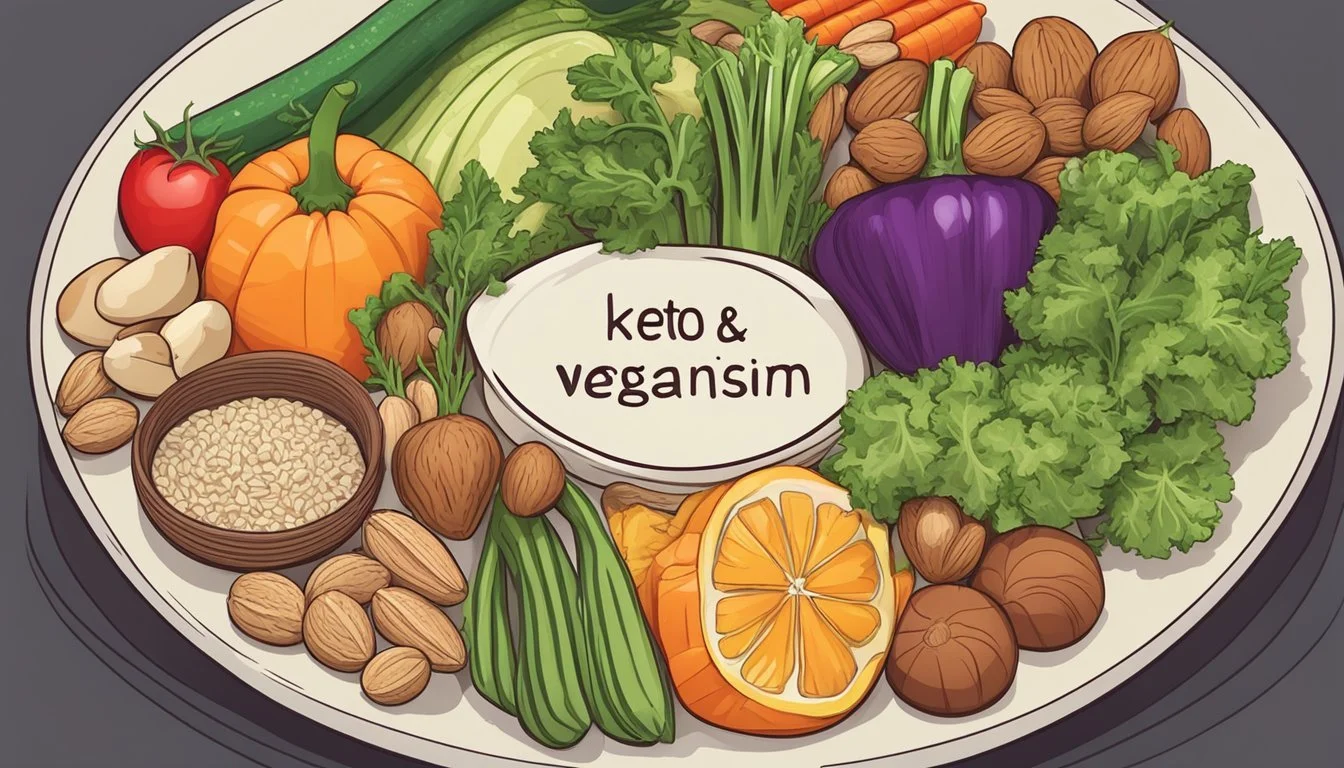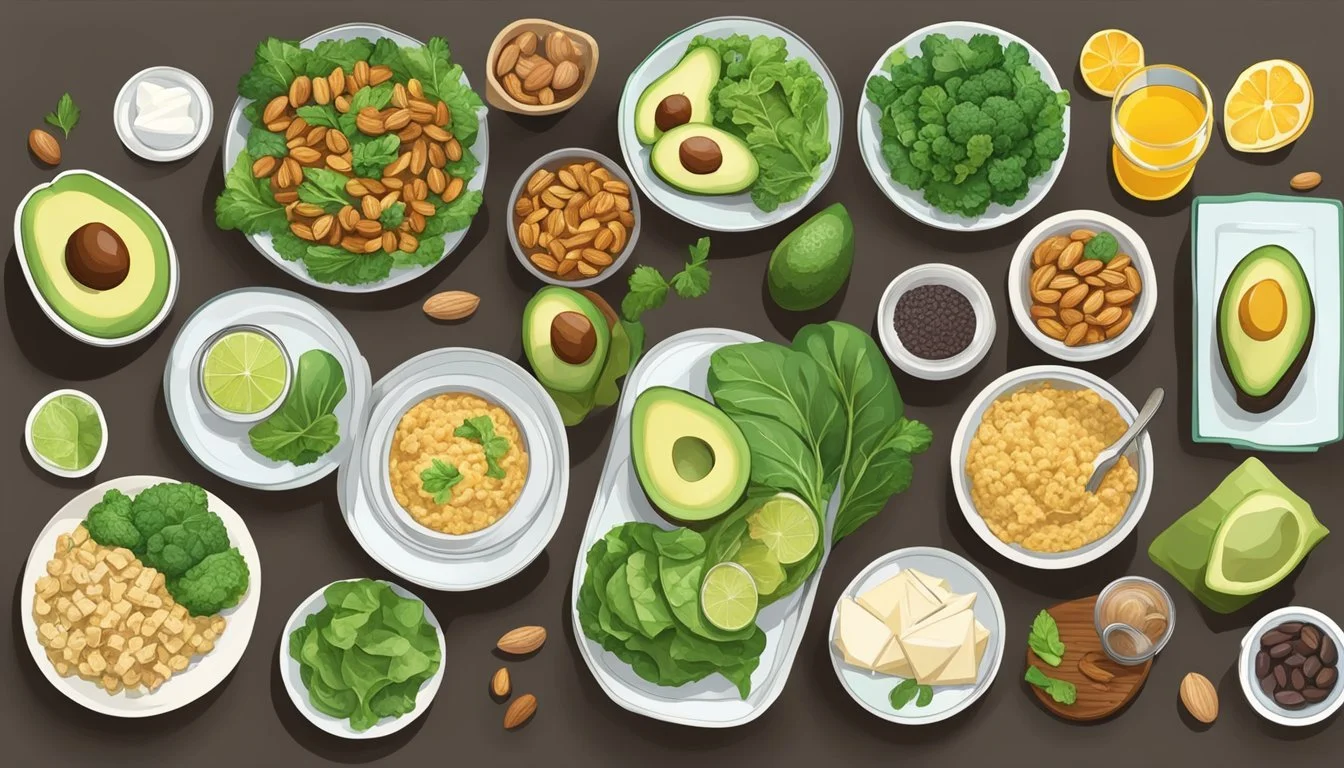Keto Diet and Veganism
Harmonizing Plant-Based Eating with Low-Carb Goals
The ketogenic diet and veganism are two lifestyle choices that significantly alter food consumption patterns. The ketogenic, or keto, diet focuses on high-fat, moderate-protein, and very low-carbohydrate intake, which pushes the body into a state of ketosis, where fat is burned for energy instead of carbohydrates. Traditionally, this diet includes meat, dairy, and other animal products to meet its fat and protein requirements.
In contrast, veganism excludes all animal products, placing emphasis on plant-based foods such as fruits, vegetables, nuts, seeds, and legumes. This lifestyle choice is often motivated by health reasons, ethical considerations regarding animal welfare, or environmental concerns. Vegans rely on a variety of plant-based sources to meet their nutritional needs, which typically leads to a higher intake of carbohydrates, fiber, and certain micronutrients compared to a standard ketogenic diet.
Combining the ketogenic principle with veganism presents a unique challenge due to the dietary restrictions of both approaches. A vegan ketogenic diet must be carefully planned to adhere to the low-carb, high-fat macronutrient ratios while sourcing all foods from plant-based origins. This hybrid diet aims to provide the health benefits associated with both veganism and ketosis, such as improved cardiovascular health, weight loss, and possible reduction in the risk of certain chronic diseases, while aligning with ethical and environmental values.
Fundamentals of Keto Diet and Veganism
Exploring the fundamentals of the ketogenic diet and veganism unveils distinct dietary frameworks, one focusing on macronutrient ratios to achieve ketosis and the other on eliminating animal-derived products for health and ethical reasons.
What Is a Ketogenic Diet?
A ketogenic diet is characterized by its low-carbohydrate, high-fat content, designed to induce a metabolic state known as ketosis. In this state, the body efficiently burns fat for energy instead of relying on glucose (sugar). Typically, the macronutrient distribution for someone following a ketogenic diet is approximately:
70-80% of calories from fats
15-20% of calories from proteins
5-10% of calories from carbohydrates
This ratio can vary based on individual needs and goals. The ketogenic diet traditionally includes animal products; however, adaptations exist for those wishing to adhere to vegan principles.
What Is Veganism?
Veganism is a lifestyle choice and dietary practice that excludes all animal products and by-products. Individuals who follow a vegan diet opt for solely plant-based diet sources, which inherently tend to be lower in fats and higher in carbohydrates. The core principle of veganism is to avoid the use of products and substances derived from animals, whether for food, clothing, or any other purpose. Those who adopt a vegan diet often do so for a combination of health, environmental, and ethical reasons. Vegan diets are diverse but generally include:
A variety of vegetables and fruits
Legumes such as beans and lentils
Nuts and seeds
Whole grains
While vegan diets are not inherently designed for ketosis, they can be adapted to align with ketogenic principles, resulting in a vegan ketogenic diet. This adaptation involves meticulous planning to ensure an intake of low-carb, high-fat plant foods while meeting all nutritional needs.
Health Implications
Adopting a specific diet can lead to considerable changes in health outcomes. The keto and vegan diets, in particular, have been shown to impact weight management and various health markers, while also having potential risks and considerations.
Benefits of Keto and Vegan Diets
Ketogenic Diet:
Weight Loss: Individuals often experience rapid weight loss due to reduced carbohydrate intake and increased fat metabolism.
Blood Sugar Control: It can improve blood sugar levels, which may benefit individuals with type 2 diabetes.
Cholesterol: Some people see an improvement in their HDL (good) cholesterol levels, although LDL (bad) cholesterol may increase in others.
Vegan Diet:
Heart Disease and Obesity: High in fiber and typically low in saturated fat, contributing to lower rates of heart disease and obesity.
Cancer Risk: May lower the risk of certain cancers due to higher intake of fruits, vegetables, and whole grains.
Overall Health: Plant-based diets are associated with improved overall health markers and longevity.
Risks and Considerations
Ketogenic Diet:
Nutrient Deficiencies: Restrictive nature can lead to deficiencies in essential vitamins and minerals, such as vitamin D, calcium, and magnesium.
Inflammation: Some individuals may experience increased inflammation due to high saturated fat intake.
Long-term Health Effects: Long-term effects are not well understood, and there could be an increased risk of heart disease due to high animal fat consumption.
Vegan Diet:
Iron and Vitamin B12: Risk of deficiencies in iron, vitamin B12, and vitamin D, which are commonly found in animal products.
Protein Intake: May need to carefully plan to consume adequate protein from various plant-based sources.
Bone Health: Some studies suggest a potential link between veganism and lower bone density, although more research is needed.
Both diets require planning to ensure sufficient nutrient intake and may not be suitable for everyone. It's essential for individuals to consult with healthcare providers before significantly changing their eating habits.
Nutritional Components Analysis
The ketogenic and vegan diets are distinct in their approach to nutritional intake, diverging primarily in their macronutrient and micronutrient profiles. Understanding these differences is critical for ensuring a balanced and healthful diet.
Macronutrients in Keto and Vegan Diets
Ketogenic Diet:
Protein: Moderate intake, focusing on meat, fish, and dairy products.
Carbs: Very low intake, typically 20-50 grams per day to maintain ketosis.
Fats: High intake, forming the cornerstone of the diet from sources like avocados, butter, and oils.
Fiber: Can be low due to the restriction of carb-rich fruits, grains, and legumes.
Vegan Diet:
Protein: Adequate but requires careful planning. Sources include legumes, nuts, and soy products.
Carbs: Higher intake, comprising staples such as fruits, vegetables, grains, and legumes.
Fats: Lower than keto, with a focus on unsaturated sources like nuts, seeds, and avocados.
Fiber: High intake from whole plant foods, beneficial for digestive health.
Micronutrients and Vitamins
Ketogenic Diet Micronutrients:
Iron: Often adequate due to the consumption of red meat.
Vitamin D: Sufficient levels can be maintained with fatty fish and fortified foods.
Vitamin B12: Adequate through animal product consumption.
Vegan Diet Micronutrients:
Iron: Present in plant foods but non-heme iron is less readily absorbed. May require combination with vitamin C rich foods for better absorption.
Vitamin D: Can be challenging to obtain sufficiently from sunshine and diet alone; supplementation is often recommended.
Vitamin B12: Not naturally found in plant foods; supplementation or fortified foods are necessary to prevent deficiency.
Both diets can provide the necessary nutrients, but they require different strategies and considerations. The ketogenic diet focuses heavily on fats, while the vegan diet emphasizes carbohydrates and fiber. Both diets encourage the monitoring of micronutrient intake to address potential deficiencies.
Combining Keto with Veganism
Transitioning to a ketogenic diet typically involves a significant reduction in carbohydrate intake and an increase in fat consumption to achieve ketosis. When incorporating veganism, attention to nutrient intake from plant-based sources becomes essential.
Feasibility of Vegan Keto Diet
The vegan keto diet merges the principles of veganism—abstaining from animal products—with the macronutrient ratios of the ketogenic diet. It is important to strategize protein and fat intakes while maintaining low carbohydrates to ensure nutritional adequacy. Individuals embrace this diet for its potential health benefits, which include weight management and improved metabolic health.
A vegan keto diet necessitates careful meal planning. A typical nutrient ratio might include approximately 70% of daily calories from fats, 25% from proteins, and 5% from carbohydrates. These ratios ensure that the body enters a state of ketosis, where it burns fat for energy instead of carbohydrates.
Food Choices and Alternatives
On a vegan keto diet, food choices revolve around macro-balanced, plant-based options. The table below outlines suitable food categories and examples:
Category Food Examples Fats Coconut oil, olive oil, avocados, nuts and seeds Proteins Tofu, tempeh (What wine goes well with tempeh?), nut butter Carbohydrates Leafy greens, low-carb vegetables, berries
Fats play a pivotal role in the vegan keto diet. Sources like coconut oil and olive oil are prevalent, along with avocados, nuts, and seeds. These not only impart essential fatty acids but also help in maintaining satiety.
Protein intake is carefully measured, with plant-based proteins like tofu and tempeh taking center stage. Other protein-rich alternatives include nuts, seeds, and nut butters. It's crucial that these foods are unprocessed or minimally processed to avoid unintended carbohydrate intake.
Carbohydrate sources are predominantly from non-starchy vegetables and leafy greens, contributing to the necessary fiber and micronutrients without exceeding the carb limit. Moderate quantities of berries can be included, as they are lower in carbs compared to other fruits. Coconut milk can be used as a dairy alternative for its low carb and high-fat profile, aligning well with the dietary requirements.
Practical Guidance
Successfully combining a keto diet with veganism requires a conscientious approach to meal planning, shopping, and social engagements. This section provides specific strategies to help individuals navigate these areas with confidence.
Meal Planning and Preparation
Careful planning is critical to ensure that one meets all nutritional needs while adhering to the constraints of a vegan keto diet. A person should prioritize vegan protein sources, such as nuts, seeds, and nutritional yeast, while integrating a variety of whole grains, beans, and legumes within their carb limit.
Fats: Emphasize plant-based fats like olive oil, coconut oil, and vegan butter.
Proteins: Include tofu, tempeh, and hemp seeds for adequate protein.
Carbohydrates: Choose fibrous, low-carb vegetables like kale, broccoli, and spinach.
Incorporating meal prepping into one's routine can simplify the process, helping to avoid the temptation of convenient processed foods.
Shopping and Budget
To manage cost without sacrificing quality, individuals should focus on buying in-season produce, which is often more affordable. Bulk purchasing of nuts, seeds, and whole grains can also reduce expenses. Reading labels is essential to avoid hidden carbs and non-vegan ingredients commonly found in sauces, condiments, and dressings.
Buy in bulk: Grains, nuts, and seeds can be more cost-effective when bought in larger quantities.
Farmers' markets: Local markets may offer competitive prices on fresh produce and specialty items.
Compare prices: Check different stores and online retailers for the best deals on vegan keto products.
Dining Out and Social Situations
The difficulty of maintaining a vegan keto diet increases when dining out or in social settings. Individuals should scan menus in advance for dishes that can be modified to fit a vegan keto profile, and they shouldn't hesitate to inquire about customizing orders. Carrying keto-friendly vegan snacks can prevent one from being caught unprepared in social situations.
Restaurant selection: Choose eateries that offer vegan and keto-friendly options.
Communicate dietary restrictions: Clearly express one's dietary needs to the server or host.
Snack preparation: Keep a supply of keto-friendly vegan snacks for unforeseen circumstances.
By incorporating these practical guidelines, the intricacies of managing a vegan keto diet can be navigated with ease.
Sustainability and Ethical Considerations
The ketogenic (keto) diet and veganism are both popular dietary choices, yet they present distinct profiles when it comes to sustainability and ethics. This section considers the environmental impact and animal welfare considerations associated with each.
Environmental Impact
The environmental sustainability of a diet is often evaluated by its carbon footprint, which measures the amount of greenhouse gases produced. Plant-based diets, like veganism, are generally associated with lower carbon dioxide emissions. For instance, a vegan diet is characterized by the absence of animal products and has been documented to produce the least amount of carbon dioxide compared to other diets. Conversely, the keto diet, which is high in animal products and low in carbohydrates, ranks lower in sustainability. The production of animal-based food items typically requires more resources and releases more emissions than plant-based alternatives.
Keto Diet:
Higher carbon footprint due to reliance on animal products.
Increased resource use (land, water, feed).
Vegan Diet:
Lower carbon footprint as it eschews animal products.
Reduced resource use, leading to a potentially more sustainable option.
Animal Welfare and Ethics
Animal welfare and ethics are central to the vegan diet, which excludes all forms of animal exploitation and cruelty. By avoiding animal products altogether, those following a vegan diet seek to reduce harm to animals and oppose practices perceived as unethical within animal agriculture, including the industrial farming of animals for food.
The keto diet's heavy reliance on animal products brings with it ethical considerations surrounding the treatment of animals in the farming process. The ethical stance of individuals on the keto diet varies, with some choosing to source from farms that uphold higher welfare standards, while others may not take these considerations into account.
Veganism:
Prioritizes animal welfare; avoids all animal products and by-products.
Engages with the ethical concerns regarding the treatment of animals in food production.
Keto Diet:
Consumption of animal products necessitates consideration of ethical sourcing and animal welfare.
Greater diversity in adherence to animal welfare standards among followers.
This section has explored how both keto and vegan diets impact sustainability and animal ethics, revealing significant differences that align with their fundamental dietary principles.
Success Stories and Case Studies
The narratives of individuals committing to Keto or Vegan diets often recount significant health transformations and the overcoming of various challenges. These stories serve not only as testimonials to the diets' potential efficacy but also highlight the personal perseverance required.
Weight Loss and Health Transformation
Keto Diet:
Individuals: Many report substantial weight loss and improvements in body mass index (BMI).
Outcomes: Reports often cite decreased blood pressure and improvements in type 2 diabetes control.
Duration: Success stories typically span several months to years, demonstrating sustained commitment.
Vegan Diet:
Individuals: Adherents frequently note weight management benefits and a general feeling of improved health.
Outcomes: Some experience reductions in risk factors associated with heart disease and cancers.
Duration: Transformative results generally occur over an extended period, reflecting lifestyle changes.
Challenges Overcome
Keto Diet:
Difficulty: Adapting to a low-carbohydrate regime presents challenges, such as initial fatigue or 'keto flu'.
Risks: The diet necessitates careful management to avoid potential risks like nutrient deficiencies.
Vegan Diet:
Difficulty: Overcoming the reliance on animal-based foods can be a considerable challenge for new vegans.
Risks: Ensuring adequate intake of all essential nutrients, particularly B12 and complete proteins, is crucial.
Additional Resources
When embarking on a vegan keto journey, having the right resources at hand can significantly enhance one's experience. A variety of cookbooks and community support groups cater specifically to vegan keto dieters, providing tailored advice, meal prep guidance, and recipes.
Cookbooks and Recipes
A comprehensive array of cookbooks are dedicated to vegan keto cuisine, offering a plethora of recipes that fit the low-carb, high-fat vegan diet. They typically provide detailed nutritional information, making it easier for individuals to adhere to their macronutrient goals. Here are a few recommended resources:
Vegan Keto Cookbook: A great source for those who prefer a tangible guide with structured meal plans and grocery lists for efficient meal prep.
Online Recipe Blogs and Websites: Ideal for those who seek a wide variety of options and love to explore new culinary ideas regularly.
Community and Support Groups
Community support is paramount for staying motivated and getting practical advice. Support groups, both online and in-person, offer an avenue for dieters to share experiences, swap recipes, and discuss challenges they face. Key platforms include:
Online Forums and Social Media Groups: They provide an inclusive space to connect with fellow vegan keto enthusiasts from around the world.
Local Meetup Groups: These are perfect for connecting with local members for shared meal prep sessions and recipe exchanges.
By leveraging these resources, individuals can deepen their understanding of the vegan keto diet and find the encouragement needed to maintain this lifestyle change.








